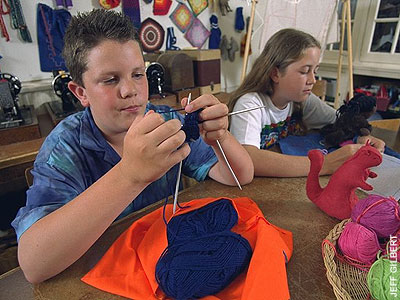Another class of learning
When pressure-cooker schooling failed her son, Fiona Longsdon turned to Steiner
Children are losing their childhood through the pressures of modern life, say some of the most influential voices in the country. Computers, electronic games and a test-driven exam system have all been blamed for taking away the joy of conversation and play. But for me the problem lay closer to home, in the expectations that my husband and I had of our son from the outset. Looking back, I nearly made the biggest mistake of my child's life.
Students at a Steiner school, where learning is a process of discovery and exploration
Theo is the eldest of our three children, the cherished first grandchild adored by all. My baby got everything. He moved seamlessly from a happy nursery group to the Reception class at our local primary school, where he mastered reading and writing rapidly, devouring books and begging for sums.
We felt excited by his progress, and the following year moved him to a leading prep school, where he continued to excel and won the gold Form prize at the end of Year One. I remember describing him as "a perfect little head-boy type", and now blush with the shame of it.
The change in his behaviour came as he turned seven. It began with churlish attitudes and a gradual withdrawal from family life, and climaxed in a crisis of bed-wetting and phantom tummy aches.
When grandparents discreetly asked for present suggestions last Christmas, it became obvious that he didn't really play any more. The Lego and the train set had been packed away for months. Saturdays had become a drill of tennis coaching and swimming lessons. At some time during this period he had stopped having fun. I would find him sifting through a drawer in search of nothing in particular or provocatively indenting the kitchen table with his initials. An aimless pursuit of killing time had become his pattern.
We began analysing every aspect of his life. We met Theo's teachers, who agreed that there had been a dramatic loss of focus and enthusiasm. They suggested some psychometric tests, from which we were told that Theo's handwriting (which, admittedly, lapsed into schoolboy scrawl by the end of the day) represented a weak wrist movement, and the verdict was dyspraxia. Physiotherapy and extra lessons were suggested. It was hard to disguise my contempt for such a diagnosis. The problem was that he had lost the fun, the colour. Did they not have a label for that?
Then a friend suggested looking at Steiner education. We visited four schools and from the first were converted by what we saw - a wholesome environment where free and fun-loving children were being nurtured through education, where learning was a process of discovery and exploration.
Our middle-class aspirations were deeply ingrained, and it was not an easy transition for us. Withdrawing Theo from the National Curriculum in favour of Steiner's, which centres on the child and each stage of their development, felt like a decision without a safety net. There was not much support from family or friends. The main misconception was that Steiner children ruled in anarchic disarray, where education was sacrificed in favour of wild freedom. My husband had enjoyed a successful time as an Eton Scholar, and we were anxious not to sabotage Theo's future opportunities. But Rudolf Steiner believed that "education is a journey, not a race". As we were already witnessing the detrimental effects of the race, we felt we had no option.
To get Theo a place at the Steiner school of our choice, we decided to move from Suffolk to Gloucestershire, thus closing one chapter and opening an unknown one. There has been plenty to keep me awake at night, not least the huge risk we are taking by, essentially, putting our child's happiness first. It seems so obvious now, but hadn't I thought I was doing that all along?
With hindsight it's easy to see our mistakes. We were so focused on being the perfect parents, managing his life with faultless accuracy and establishing an exemplary template for his life ahead, that he simply didn't know what was expected of him, or this thing called Life. We had catastrophically missed the point.
Since term at the new school began a few weeks ago, the change in Theo has been dramatic. The colour has returned to his cheeks and there's a twinkle in his eye. He talks excitedly about his lessons and new friends, energetically plays "chase", makes camps and climbs trees, devours the Famous Five books and keeps his football skills honed. There are the usual sulks and stamps of any seven-year-old but it is as though he can breathe again. Welcome back, Theo.
� Copyright of Telegraph Group Limited 2006. Re-printed with their kind permission.

